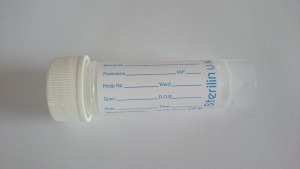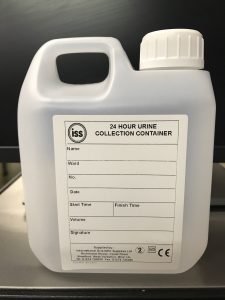

Urogenital Schistosomiasis is caused by Schistosoma haematobium a tropical blood fluke. In patients with haematuria, eggs may be found trapped in the blood and mucus in the terminal portion of the urine specimen.
Total urine between 10am-2pm or Terminal Stream Urine over 24hrs
Sterile universal without boric acid (boric acid containers will be rejected) or a 24hr urine collection vessel
For electronic requesting using EPIC (RDUH ONLY):
Search for: ‘Ova, cysts and parasites (OCP) screen‘ or test code ‘LAB258‘ – please state ‘Schistosoma Microscopy’ on the request
The density of ova in urine varies throughout the day, with the highest concentration between 10 am and 2 pm. It is therefore preferable to obtain total urine collected over the time period between 10am and 2pm, or terminal stream urines collected over a whole 24 hour period.
Please contact the laboratory to discuss with a Medical microbiologist prior to sending samples as often a blood test (serology) is preferable to urine investigations.
The most common symptom of urogenital schistosomiasis is blood in the urine, please check for haematuria prior to sending a specimen.
Please clearly state ‘Schistosoma Microscopy’ on the request and include details of foreign travel.
Microscopy for the eggs of Schistosoma haematobium
Processed locally in Microbiology at RDUH
24-48hrs
Please contact the laboratory to discuss.
(Key words: Bilharzia, Schistosoma, Schistosomal, Schistosomiasis)
Specimen Labelling Procedure